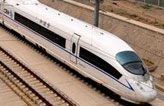Editorials
Getting back on track
Updated: 2011-07-15 07:38
(China Daily)
Were it not for the recent spate of problems, we would have been acclaiming the Beijing-Shanghai high-speed line as the railway authorities expected.
On Sunday, 10 days after the high-profile launch of the Beijing-Shanghai high-speed rail line, a dozen trains on route to Shanghai were halted for about 90 minutes following a power failure caused by thunderstorms and heavy winds in Shandong province.
On Tuesday, a power failure in Anhui province caused the delay of several trains, and this was followed on Wednesday by the breakdown of a train heading from Shanghai to Beijing, which delayed passengers by more than two hours.
The lack of a timely explanation from railway personnel about the nature of the problem caused anxiety and chaos among some passengers.
The three incidents on the Beijing-Shanghai line within only four days have resulted in public concern about the safety of high-speed trains and dissatisfaction with after-accident management and services.
However, the railway authorities responded by saying that the automatic halting of trains in these minor incidents demonstrates the high safety standards applied to the country's high-speed lines. Such an argument may be logical reasoning, but falls short in satisfying needs of passengers and market operations.
A team of 30 Chinese engineering academicians and experts inspected the safety aspects of the Beijing-Shanghai line, including its communication signals, power supply and operation control, ahead of its formal launch and concluded that the line meets the required national safety standards.
Some railway experts have pointed out that it is normal for problems to occur, especially on a new line. Even in Japan, the widely recognized birthplace of high-speed trains, similar kinds of problems also occasionally occur.
We have not stinted in our applause for the remarkable progress we have achieved in recent years in developing the country's high-speed rail network. As a developing nation that started its high-speed rail construction much later than developed countries, the Beijing-Shanghai high-speed railway speaks volumes for its technical achievements.
However, the recent problems indisputably tell us that the high-speed rail software and emergency management require tangible improvements, although we have achieved outstanding and admirable hardware performance.
As a move that was allegedly going to pose a challenge to aviation companies, the current high-speed rail services and emergency management, if not substantially improved, will dampen people's enthusiasm for high-speed trains.
To regain public support for high-speed trains, the railway authorities should conduct a thorough probe into the Beijing-Shanghai line and make the investigation results available to the public. It should also respond to public calls for compensation in a direct rather than in an elusive and ambiguous manner.
(China Daily 07/15/2011 page8)
E-paper

Burning desire
Tradition overrides public safety as fireworks make an explosive comeback
Melody of life
Demystifying Tibet
Bubble worries
Specials

Setting the pace in Turkey
China is building a 158-km high-speed railway in Turkey.

Moving up the IMF ladder
Christine Lagarde has proposed the appointment of Zhu Min to the post of Deputy Managing Director.

90th anniversary of the CPC
The Party has been leading the country and people to prosperity.
